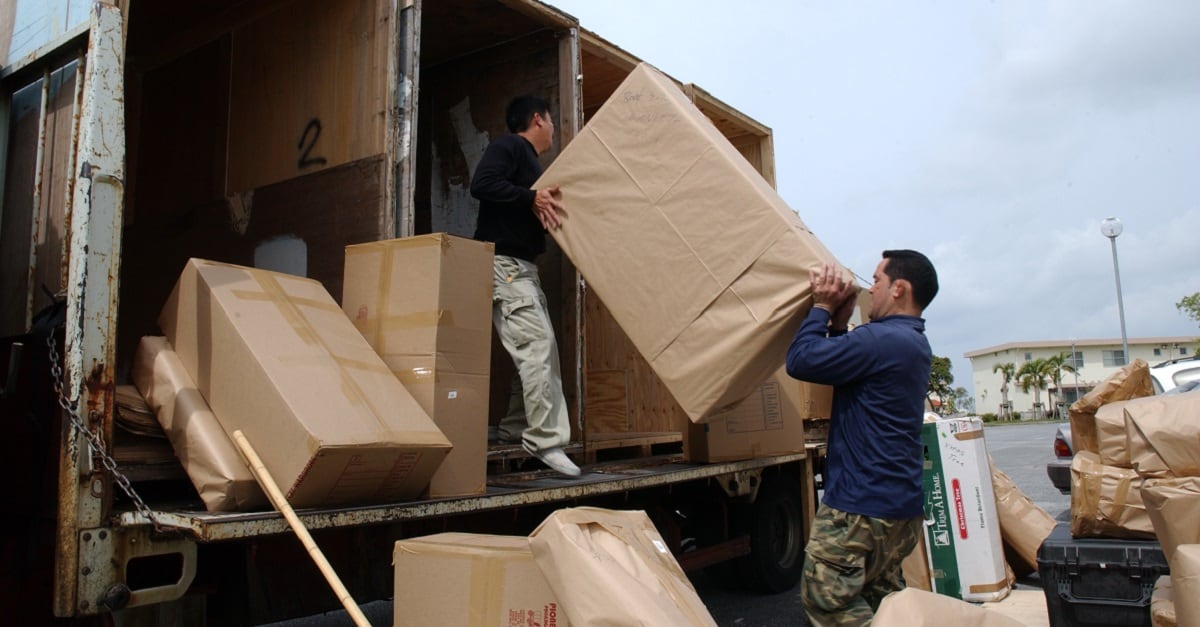Updated to include comment from U.S. Transportation Command
Two unsuccessful bidders on a $7.2 billion contract that will outsource the management of service members’ household goods moves have filed more protests, in a fight that could ultimately push the start of the massive change until late in 2021.
The contract doesn’t affect service members’ moves currently under way; all household goods moves will continue under the current system, managed by U.S. Transportation Command, until February 2021.
It’s not clear if that timeline will change because of the protests. But TRANSCOM officials said work on the transition phase of the contract is suspended until the Government Accountability Office issues its decisions on the protests.
“We are confident the award decision will withstand GAO’s scrutiny, and look forward to delivering this solution to DoD families,” officials said in a statement provided to Military Times.
These protests and other potential delays could possibly push the contract start until October 2021 to avoid starting the new contract during the peak season of 2021, said John Becker, interim president of the American Moving and Storage Association. That’s regardless of who ends up with the contract.
Meanwhile, this year’s military moving season has been beset with delays because of the coronavirus pandemic, and service members’ moves normally made in the summer are likely to extend into next year.
The $7.2 billion contract covers a nine-month transition period and three-year base period. But if all the options are exercised, the contract will be worth about $20 billion over nine years.
The protests were filed July 13 with the Government Accountability Office by Connected Global Solutions, LLC and HomeSafe Alliance LLC. They are the latest attempts to reverse TRANSCOM’s decision to award the contract to American Roll On Roll Off Carrier Group, of Parsippany, N.J., also known as ARC.
GAO is required to make a decision on a protest within 100 calendar days — by Oct. 21 — although GAO officials push to make decisions sooner. But if GAO denies the protests, the option of the U.S. Court of Federal Claims is also available.
The bidders also filed protests in late May. TRANSCOM pulled back the contract, investigated, then re-awarded the contract to ARC on June 29.
“U.S. TRANSCOM’s decision to re-award the [Global Household Goods Contract] in light of the serious issues raised is extremely disappointing,” said Al Thompson, CEO of HomeSafe Alliance, in a statement. “We are confident GAO will agree that errors have been made on a major contract that touches every member of the armed forces and their families.
“Not only did the selected bid exceed other highly qualified bids by more than $2 billion, but its team of large business subcontractors account for only 35 percent of the total DoD moving market,” he said. “With the 2021 military moving season set to be the most complex on record, it is imperative that the GAO take the appropriate action that will have the best long-term impact on military members and their families.”
The contract, aimed at fixing military families’ long-standing problems with damaged household goods, and other frustrations with movers, puts management of the moving process in the hands of a consortium of private companies.
A single commercial move manager will oversee everything related to the movement and temporary storage of household goods, essentially privatizing a function currently conducted by TRANSCOM.
TRANSCOM awarded the contract April 30. After protests were filed and allegations were made that ARC didn’t disclose adverse information about their parent company, TRANSCOM pulled back the contract June 9 to investigate.
RELATED

TRANSCOM found the allegations were unsubstantiated. According to TRANSCOM’s statement at the time, TRANSCOM’s legal counsel and the contracting officer reviewed the response and other relevant information over the course of the following week, according to the statement.
Justice Department officials confirmed to TRANSCOM that the adverse information was not affiliated with ARC or its parent company.
“After a thorough review of all relevant information, the contracting officer made an independent determination that the allegations were unsubstantiated,” TRANSCOM officials stated. During the same time, the source selection team reviewed the entire source selection record, and approved revised documentation.
ARC is the lead in the contract. The Team ARC consortium includes UniGroup, a $1.7 billion transportation company and the parent of United Van Lines, and Mayflower Transit; Suddath, a company that moves about 30,000 military members a year; Atlas World Group, the parent company of Atlas Van Lines, Inc. and Atlas World Group International; The Pasha Group, which has moved military members since 1947; and Deloitte
Karen has covered military families, quality of life and consumer issues for Military Times for more than 30 years, and is co-author of a chapter on media coverage of military families in the book "A Battle Plan for Supporting Military Families." She previously worked for newspapers in Guam, Norfolk, Jacksonville, Fla., and Athens, Ga.




